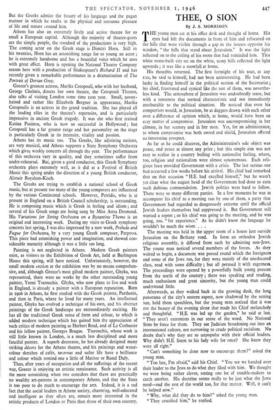THEE, 0 SION
By J. S. MORRISON
THE young man sat at his office desk and thought of home. His eyes had left the documents in front of him and refocused on the hills that were visible through a gap in the houses opposite his window, " the hills that stand about Jerusalem." It was the light reflected on to the ceiling of his room that had reminded him. This white stone-built city set on the white, stony hills reflected the light upwards ; it was like a snowfall at home.
His thoughts returned. The first fortnight of his tour, at any rate, he said to himself, had not been uninteresting. He had been lucky in finding himself in the political section of the Secretariat ; his chief, frustrated and cynical like the rest of them, was neverthe- less kind. The atmosphere of Jerusalem was undoubtedly tense, but with a tenseness that seemed characteristic and not immediately attributable to the political situation. He noticed that even his compatriots would, in Jerusalem, be at daggers drawn with each other over a difference of opinion which, at home, would have been an easy matter of compromise. Jerusalem was uncompromising in her climate, in her scenery and in her men. Yes, for an administrator, to whom compromise was both sword and shield, Jerusalem offered an interesting prospect.
As far as he could discover, the Administration's sole object was peace, and peace at almost any price ; but this simple aim was not easy to realise in a country boiling with nationalist feeling, where, too, religion and nationalism were almost synonymous. Each reli- gious feast provided Government with a crisis. The last serious one had occurred a few weeks before his arrival. His chief had remarked that on that occasion " H.E. had excelled himself," but he wasn't yet clear what the august head of the Government had done to earn such dubious commendation. Jewish politics were hard to follow. There were so many different parties. In a few moments he was to accompany his chief to a meeting run by one of them, a party that Government had regarded as dangerously extreme until the official Jewish leaders themselves had suppressed it. But Government still wanted a report ; so his chief was going to the meeting, and he was going, too. " for experience." As he didn't know the language he wouldn't be much the wiser. . . .
The meeting was held in the upper room of a house just outside Jerusalem on the Bethany road. In form an orthodox Jewish religious assembly, it differed from such by admitting non-Jews. The young man noticed several members of the forces. As they waited to begin, a document was passed round which the foreigners and some of the Jews too, for they were mainly of the uneducated class, read with some difficulty ; but all perused it with eagerness. The proceedings were opened by a powerfully built young peasant from the north of the country ; there was speaking and reading, much enthusiasm and great sincerity, but the young man could understand little.
Afterwards, as they walked back in the growing dusk, the long panorama of the city's eastern aspect, now shadowed by the setting sun, held them speechless, but the young man noticed that it was not the beauty of the evening alone that made his Chief melancholy and thoughtful. "H.E. was led up the garden," he said at last. " They aren't extremists in our sense of the word. No National State by force for them. They see Judaism broadening out into an international culture, not narrowing to crude political racialism. No doubt that's why they are so unpopular with their official leaders. Why didn't H.E. listen to his lady wife for once? She knew they were all right."
" Can't something be done now to encourage them?" asked the young man.
"Too late, I'm afraid," said his Chief. "You see we handed over their leader to the Jews to do what they liked with him. We thought we were being rather clever, setting one lot of trouble-makers to catch another. His doctrine seems really to be just what the Jews need—and the rest of the world too, for that matter. Well, it can't be helped now."
" Why, what did they do to him?" asked the young man.
" They crucified him," he replied.


































 Previous page
Previous page